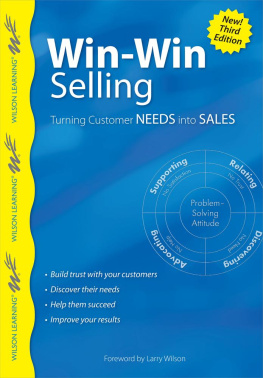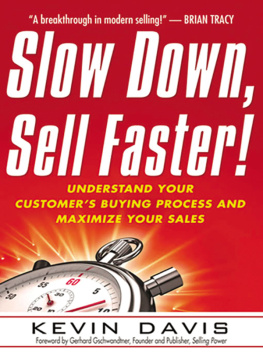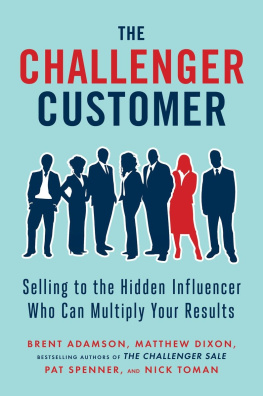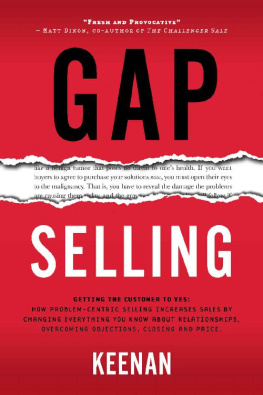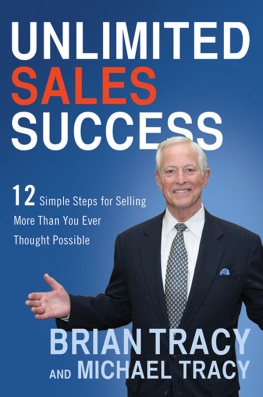Praise for Socratic Selling
Socrates is alive and well, and reminds salespeople that selling means talking with, not at, the customer. With that dialogue approach, a sale is the logical outcome.
James C. Curvey,
President, Fidelity CAPITAL
Kevin Daleys approach is a breakthrough! The Socratic method enables the salesperson to be open and consistent with the customer at those critical moments when the relationship is tested. Not to be missed are the sections on handling objections, negotiating, and closing Socratically.
Stephen G. Canton,
Vice President, Sales, Allnet
Since we implemented Socratic selling, the effectiveness of our sales force has substantially improved, resulting in dramatically higher sales in a very sophisticated market.
Thomas J. Lucey,
Senior Managing Director, Putnam Investments
Kevin Daley is a winner and a great communicator. Socratic Selling will not only help you sell more but make your customers raving fans.
Kenneth H. Blanchard,
Co-author, The One Minute Manager
In Socratic Selling, Kevin Daley teaches why the truly great sales people listen as well as talk. Socrates had the idea, but Daley shows us how to use it today. The approach works! I know; I tried it.
James W. Kinnear,
Retired CEO, Texaco, Inc.
The good news is, this book offers no secret techniques or psychological analysisjust a practical way to reach agreement with your customer. Salespeople and customers both win.
Dr. William C. Byham,
CEO, Development Dimensions International
Its amazing what you can learn when you let your customers do the talking. Kevin Daleys techniques for questioning and listening will help make your sales team more effective.
Peter A. Loquercio,
Director, Access Sales Planning, NYNEX
Apply these principles and heres Daley describing you: You are a valuable resource you are systematic, alert, reliable, worthy of trust. You make the time productive. The customer thinks more clearly when youre there.
Mark Kimble,
Managing Director, Corporate Information, The Alexander Consulting Group
Attention, business owners, purchasing agents, training managers: Use this book to decide if the salesperson who calls on you is a potential business partner, or just another somebody making a pitch.
Robert Craig,
Marketing Manager, Omni Business Systems
The best salespeople are the ones who ask very good questions and really listen to the answers. This book will help salespeople do just that.
Harry H. Gaines,
President, Blessing/White, Inc.
The results are measurable. Our Socratically trained wholesalers are the most successful.
Donald E. Webber,
Senior Vice President, Eaton Vance Corporation
All marketing wars take place in the mind of a prospect or customer. Socratic Selling is a powerful, new methodology into that mind.
Jack Trout,
President, Trout & Partners Ltd.
Sales managers who think their salespeople spend too much time talking and not enough listening should pack Socratic Selling in everybodys flight bag.
David Rupert,
President, Pitney Bowes Management Systems
Socratic Selling shows you a practical way to reach agreement with your customer.
James Molinaro,
Senior Vice President, Sales, Penske Truck Leasing


Copyright 1996 by The McGraw-Hill Companies, Inc. All rights reserved. Printed in the United States of America. Except as permitted under the United States Copyright Act of 1976, no part of this publication may be reproduced or distributed in any form or by any means, or stored in a data base or retrieval system, without the prior written permission of the publisher.
ISBN: 978-0-07-137151-3
MHID: 0-07-137151-6
The material in this eBook also appears in the print version of this title: ISBN: 978-0-78-630455-4, MHID: 0-78-630455-3.
All trademarks are trademarks of their respective owners. Rather than put a trademark symbol after every occurrence of a trademarked name, we use names in an editorial fashion only, and to the benefit of the trademark owner, with no intention of infringement of the trademark. Where such designations appear in this book, they have been printed with initial caps.
McGraw-Hill eBooks are available at special quantity discounts to use as premiums and sales promotions, or for use in corporate training programs. To contact a representative please e-mail us at bulksales@mcgraw-hill.com.
All trademarks are trademarks of their respective owners. Rather than put a trademark symbol after every occurrence of a trademarked name, we use names in an editorial fashion only, and to the benefit of the trademark owner, with no intention of infringement of the trademark. Where such designations appear in this book, they have been printed with initial caps.
This publication is designed to provide accurate and authoritative information in regard to the subject matter covered. It is sold with the understanding that neither the author nor the publisher is engaged in rendering legal, accounting, or other professional service. If legal advice or other expert assistance is required, the services of a competent professional person should be sought.
From a Declaration of Principles jointly adopted by a Committee of the American Bar Association and a Committee of Publishers.
TERMS OF USE
This is a copyrighted work and The McGraw-Hill Companies, Inc. (McGraw-Hill) and its licensors reserve all rights in and to the work. Use of this work is subject to these terms. Except as permitted under the Copyright Act of 1976 and the right to store and retrieve one copy of the work, you may not decompile, disassemble, reverse engineer, reproduce, modify, create derivative works based upon, transmit, distribute, disseminate, sell, publish or sublicense the work or any part of it without McGraw-Hills prior consent. You may use the work for your own noncommercial and personal use; any other use of the work is strictly prohibited. Your right to use the work may be terminated if you fail to comply with these terms.
THE WORK IS PROVIDED AS IS. McGRAW-HILL AND ITS LICENSORS MAKE NO GUARANTEES OR WARRANTIES AS TO THE ACCURACY, ADEQUACY OR COMPLETENESS OF OR RESULTS TO BE OBTAINED FROM USING THE WORK, INCLUDING ANY INFORMATION THAT CAN BE ACCESSED THROUGH THE WORK VIA HYPERLINK OR OTHERWISE, AND EXPRESSLY DISCLAIM ANY WARRANTY, EXPRESS OR IMPLIED, INCLUDING BUT NOT LIMITED TO IMPLIED WARRANTIES OF MERCHANTABILITY OR FITNESS FOR A PARTICULAR PURPOSE. McGraw-Hill and its licensors do not warrant or guarantee that the functions contained in the work will meet your requirements or that its operation will be uninterrupted or error free. Neither McGraw-Hill nor its licensors shall be liable to you or anyone else for any inaccuracy, error or omission, regardless of cause, in the work or for any damages resulting therefrom. McGraw-Hill has no responsibility for the content of any information accessed through the work. Under no circumstances shall McGraw-Hill and/or its licensors be liable for any indirect, incidental, special, punitive, consequential or similar damages that result from the use of or inability to use the work, even if any of them has been advised of the possibility of such damages. This limitation of liability shall apply to any claim or cause whatsoever whether such claim or cause arises in contract, tort or otherwise.


